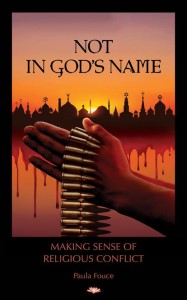 Much of the commentary surrounding recent terrorist attacks and threats might lead one to think that religious hatred is a new thing. But in fact violence and hatred in the name of religion have been around a very long time, perhaps as long as religion itself. Or at least as long as the monotheistic Abrahamic religions. For many Americans, religious violence seems to have recently arrived on American soil, but that is a bit ingenuous as well. From the Salem Witch Trials to the Sikh Temple massacre in 2012, the United States is no stranger to hatred and violence that has been justified by religious belief.
Much of the commentary surrounding recent terrorist attacks and threats might lead one to think that religious hatred is a new thing. But in fact violence and hatred in the name of religion have been around a very long time, perhaps as long as religion itself. Or at least as long as the monotheistic Abrahamic religions. For many Americans, religious violence seems to have recently arrived on American soil, but that is a bit ingenuous as well. From the Salem Witch Trials to the Sikh Temple massacre in 2012, the United States is no stranger to hatred and violence that has been justified by religious belief.
Religious bigotry seems almost built in to many religions, with their talk of “infidels” and “chosen people” and a brutal god insisting he is the only god and there is but one way to please him, and followers who can’t agree on which prophet actually got this part right.
In Not In God’s Name Independent filmmaker Paula Fouce sets out to find an answer to the question of why people hate and kill each other over religious beliefs. The book opens with a powerful narrative of the author being trapped in Delhi during the riots that erupted after Indira Gandhi was assassinated by her Sikh bodyguards, setting the stage for what is to come—a book that is part travelogue (if a rather disturbing one), and part discussion of one of the most dangerous and vexing problems facing the world today.
Fouce describes heartbreaking stories of unimaginable violence and cruelty—all in the name of God. Yet before going into the hatred and gore, Fouce describes with loving detail and deep respect the beliefs and practices of several religions. She has spent many years—a great deal of her life, in fact—in Asia, studying, documenting, and taking part in religious practices. While her personal affinity is with varieties of Hinduism and Buddhism, she shows no hint of the bigotry she is examining. Her deep respect for the religions of others comes through quite strongly.
“The most powerful enemies we are dealing with are religious fanaticism, lack of education and economic opportunity, and inaccurate information filtered down from government leaders,” Fouce writes. As one victim of such violence put it, “Some people misused religion for political means.” Yet it does seem to be the belief that provides the opportunity for those with political agendas to incite the hatred. Despite Fouce’s warm embrace of all religions and her attitude of loving kindness, this book does not make it easy to feel good about religion. Almost every spark of hope is followed by yet another description of an atrocity.
Fouce defends moderate Muslims from the Western view that all Muslims are terrorists in waiting. She mentions the Dalai Lama’s efforts to encourage peace and understanding between people of different religions and “to change the mistaken impression many Americans have of mainstream Muslims.” Fouce says that it would be “helpful if moderates of the Islamic faith and their views would be more publicized.” Indeed. Yet what that would help is the West’s policies and responses to religious extremism. I can’t see that it would have any effect at all on the extremism itself.
Not In God’s Name is an excellent introduction to the variety of religions active in the world today, their history, and the conflicts among them. And it is a more joyous read than you might imagine. While there are many difficult passages, it also sheds light on the beauty of religion and introduces us to the real people who practice religions of many kinds and with many different approaches and levels of passion. Fouce describes much good work that is being done toward encouraging respect among the many faiths, and she gives the reader a little hope. Yet when it comes down to it, she doesn’t offer many answers. Or maybe she does. They just aren’t simple answers, and it isn’t a quick fix.
Like a practitioner of Buddhism, Not In God’s Name neither clings to nor pushes away. It just looks. Very carefully and with a great deal of compassion. And perhaps that is exactly what we need to do to solve this problem. Fouce reminds us that the Dalai Lama once said, “My true religion is kindness.” When that can be said of all religions, then we may have peace at last. The Dalai Lama also said, when visiting with a group of Japanese schoolgirls, and discussing China’s brutal oppression of Tibet and Buddhism there, “This present situation has to change. Change will not come from the sky. We, as individuals, must make some effort. . . . One person leads, ten people join, a thousand people join…” With Not In God’s Name Fouce is doing an admirable job of leading.
Links
Author Site
Facebook
Amazon
Goodreads
Review Overview
Design
Content
Editing
Get an Editorial Review | Get Amazon Sales & Reviews | Get Edited | Get Beta Readers | Enter the SPR Book Awards | Other Marketing Services























Leave A Comment